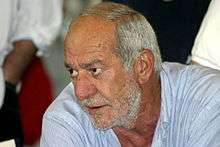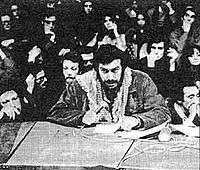Mario Capanna
Mario Capanna (born 10 January 1945) is an Italian politician and writer.
Mario Capanna | |
|---|---|
 | |
| Member of the Chamber of Deputies | |
| In office 1983–1992 | |
| Member of European Parliament | |
| In office 1979–1984 | |
| Constituency | North-West Italy |
| Personal details | |
| Born | 10 January 1945 Città di Castello, Italy |
| Nationality | Italian |
| Political party | DP (1978–1989) VA (1989–90) FdV (1990–92) |
| Alma mater | University of Milan |
| Profession | Politician, writer |
Born in Città di Castello, he studied Philosophy at the Catholic University of Milan, and was the leader of the Italian students' movement in the late 1960s and early 1970s. In 1969 he was attacked by exponents of the neo-Fascist Italian Social Movement.

In 1975 he entered politics, adhering to the Proletarian Unity Party (PdUP), which later merged with Proletarian Democracy (DP). Capanna was charismatic leader of the latter until 27 June 1987, when he resigned, succeeded by Giovanni Russo Spena.
Capanna was elected for the DP to the Italian Chamber of Deputies (1983–1987), and to the European Parliament (1979).[1]
In 1989 he broke away from the Proletarian Democracy to form the Rainbow Greens party.
Capanna is currently President of the Committee for Genetical Rights, an independent association devoted to information on Biotechnology.
Capanna is a supporter of the Campaign for the Establishment of a United Nations Parliamentary Assembly, an organisation which advocates for democratic reformation of the United Nations.[2]
Works
- Formidabili quegli anni (1988)
- Arafat (1989)
- Speranze (1994)
- Il fiume della prepotenza (1996)
- Lettera a mio figlio sul '68 (1998)
- L'Italia viva (2000)
- Verrò da te (2003)
References
- "Your MEPs : Mario CAPANNA". Europa. European Parliament. Retrieved 5 March 2011.
- "Statements". Campaign for a UN Parliamentary Assembly. Retrieved 2017-09-28.